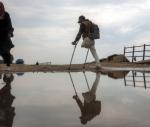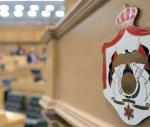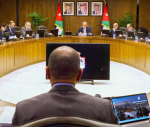You are here
Resisting oblivion in the New Year
Jan 08,2016 - Last updated at Jan 08,2016
At the beginning of the New Year, I cannot help but remember Hadeel Rajabi, an 11-year-old child.
Do I need to say that she is, like all children at this age, full of a combination of innocence, ambition, stubbornness and perhaps mischievousness?
Yes, I do, as she is Palestinian. As a result of her “identity”, she is forced to take a different, much more winding course, with no certainty whatsoever as to how that course will look like in the future.
On January 18 last year, Hadeel was not given a gift, nor was she expecting one. She was not rewarded for being a high-achieving student, either. She was reminded that she is a Palestinian, as she was summoned to the Qishla police station in the western part of the Old City of Jerusalem.
And this is how she ended the previous year: not with candy, but with cross-examination.
She was reminded that her childhood and concomitant innocence do not matter and that she is a Palestinian first and foremost — her age being irrelevant.
Almost six months earlier, she was not allowed to enter Al Aqsa Mosque compound. That was April 26, 2015; the Israeli colonial army “blacklisted” her.
Prior to that, they had banned her mother from entering the compound.
At such a formative stage in her life, Hadeel must have many questions in mind that she has inherited from 2015.
Why she? Why her family? Why her people?
Hadeel might not know the answers to all those questions, but she is definitely thinking of some answers.
One would think that one of those answers is that there is no hope, as this year will be similar to the previous.
Yet, that experience made her all the more determined after the interrogation.
According to Al Araby Al Jadeed, she emphatically said: “Al Aqsa compound is ours, and they cannot prevent us from entering it.”
She made that statement despite the injuries an Israeli soldier had inflicted on her and that she still remembers.
Etched in the mind of this child is refusal to accept oblivion.
Hadeel’s story is just one among too many.
According to the Defence for Children International - Palestine, the Israeli army killed almost 2,000 between 2000 and 2015, detained an average of 250 children between the ages of 12 and 17, demolished many houses where children used to live, and even — the word “even” is superfluous here — used children as human shields, debunking the Israeli myth.
On top of all that, the Israeli army constantly deprives Palestinian children of the right to education by consistently subjecting them to checkpoints and school closures.
According to the Monthly Humanitarian Bulletin of November 2015 that was published by the UN Office for the Coordination of Humanitarian Affairs in occupied Palestinian territories, there are “4,200 children in Hebron city who must cross at least one military checkpoint and undergo inspections and searches to reach their schools”.
This abominable state led the Monitoring and Reporting Mechanism under the Children and Armed Conflict Office to publish a letter that was addressed to the UN Security Council by the secretary general, on June 5, 2015, urging Israel “to take concrete and immediate steps” to protect Palestinian children.
But focusing on children should not distract one from the larger picture.
More often than not, one tend to forget about those children’s parents and extended families. By so doing, one ignores the concrete conditions that all Palestinians, regardless of age or sex, have to experience, conditions that prevent them from forgetting even if they want to.
Although Israel is extremely invested in erasing any form of Palestinian life and making Palestinians forget, it consistently keeps reminding them of their harsh realities.
While Israel claims that it is embattled and beset by people who seek its destruction, it is actually embattling itself; it is a self-destructive machine.
I am reminded of Kafka, a Jewish writer, who wrote a story, titled “In the Penal Colony”, about a torture machine that ends up killing the torturer.
Israel is monomaniacally going in that direction, and its policies will definitely backfire.
But regardless of whether Israel makes its colonialism more and more visible or not, Palestinians — young, old, women and men — will continue to remember, and one day, the New Year will be a happy one for them.
Israel is adamant about hastening that day.
The writer, a Fulbright scholar, is professor of English literature at the University of Jordan. He contributed this article to The Jordan Times.












